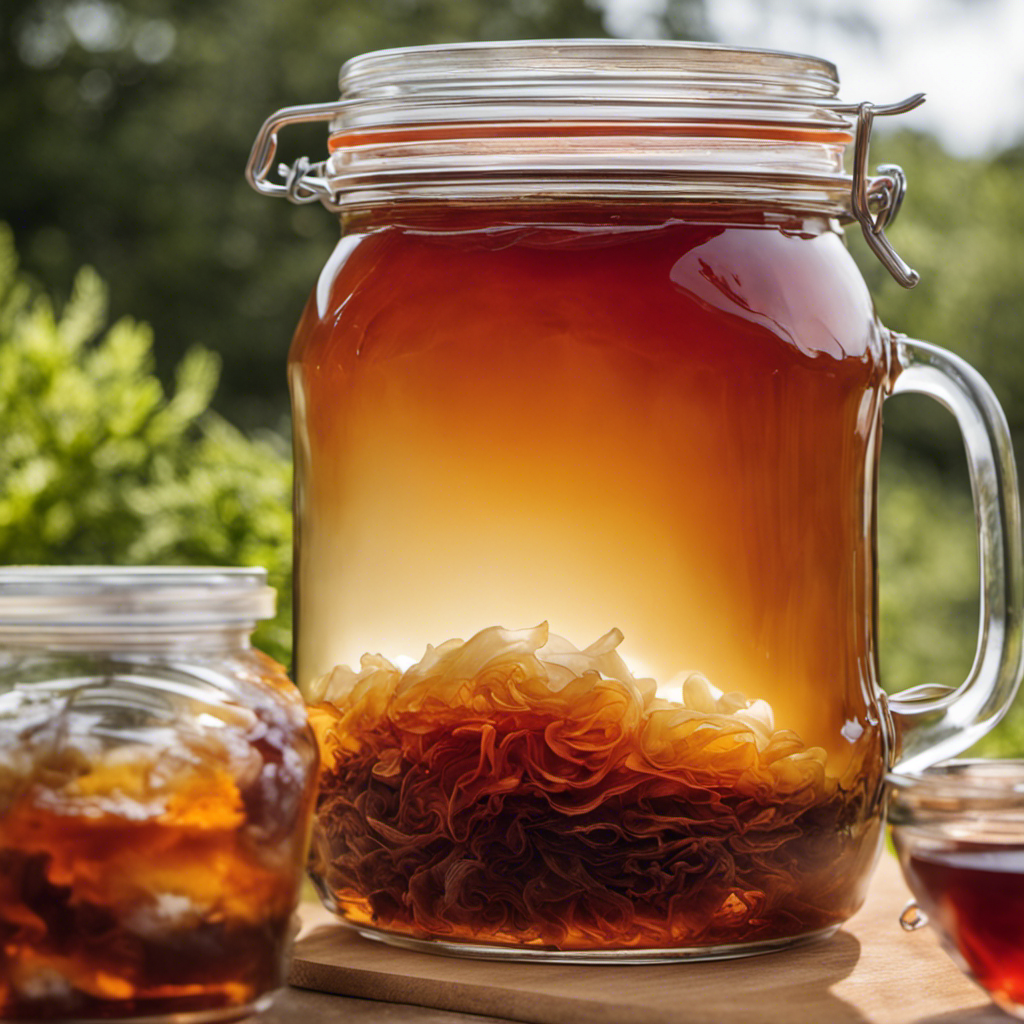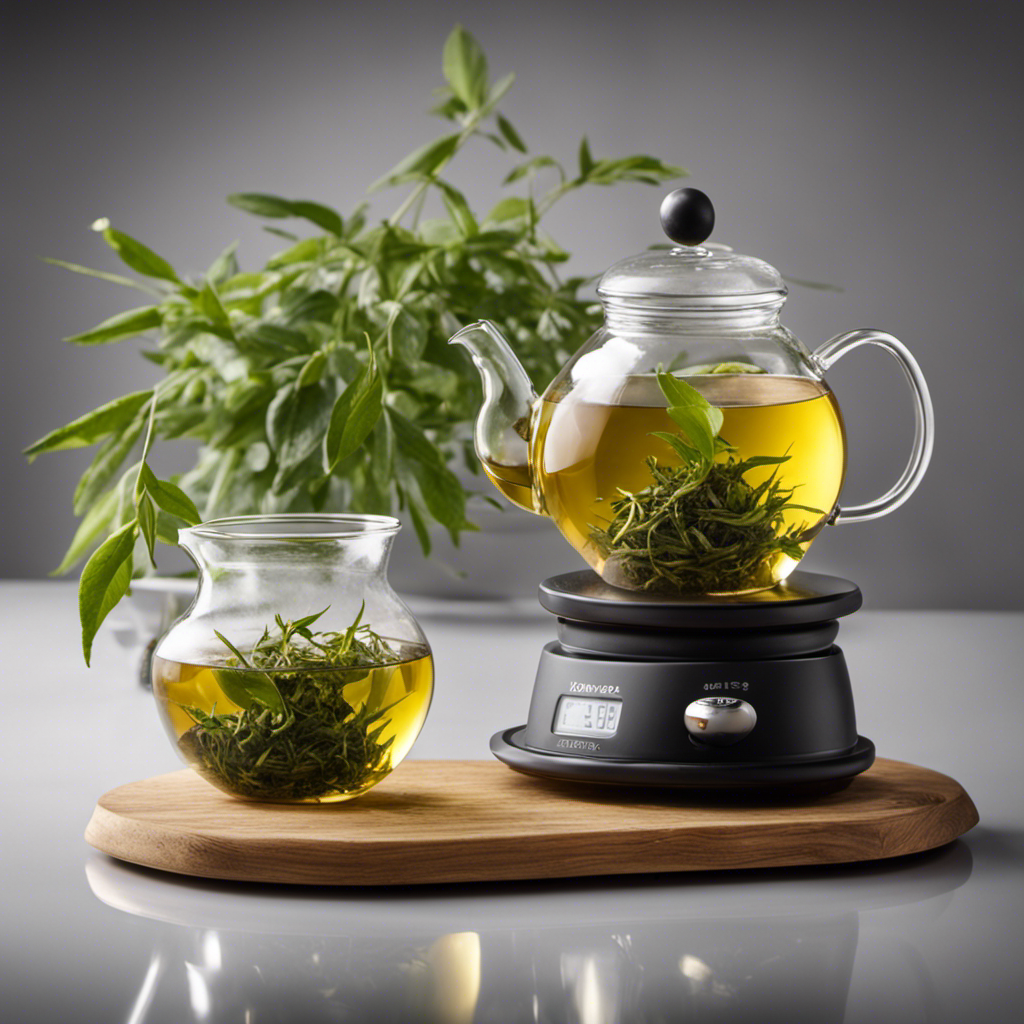Turmeric Tea
When Should I Drink Turmeric Tea For Weight Loss?

As someone who has struggled with weight loss, I understand the importance of finding natural remedies to aid in the process. One such remedy that has gained popularity in recent years is turmeric tea.
Turmeric, a spice commonly used in Indian cuisine, contains curcumin which has been shown to have anti-inflammatory and antioxidant properties. But when is the best time to drink turmeric tea for weight loss?
There are a few different theories on this topic and it largely depends on your personal preferences and lifestyle. Some suggest drinking turmeric tea in the morning before breakfast as it can help boost metabolism and digestion for the day ahead. Others recommend drinking it before bed as it may aid in reducing inflammation and promoting better sleep.
In this article, we will explore these different options as well as other ways to incorporate turmeric tea into your weight loss regimen.
Key Takeaways
- Drinking turmeric tea before or after meals may help regulate blood sugar levels and aid in weight management.
- Turmeric tea alone may not yield significant weight loss results, but it can aid in weight loss when combined with a healthy diet and regular exercise.
- Turmeric tea contains curcumin with anti-inflammatory and antioxidant properties, which can reduce inflammation in the body and improve metabolic health.
- Timing is key when incorporating turmeric tea into a daily routine, and it should be personalized based on individual needs and preferences.
Understanding Turmeric Tea
Turmeric tea is a great way to incorporate the anti-inflammatory benefits of turmeric into your daily routine. This herbal tea has been used for centuries in traditional medicine systems, such as Ayurveda and Traditional Chinese Medicine, due to its powerful health-promoting properties.
Turmeric contains a compound called curcumin, which has been shown to have antioxidant and anti-inflammatory effects. Drinking turmeric tea regularly may help reduce inflammation in the body, which can contribute to chronic diseases like heart disease, cancer, and diabetes.
Additionally, turmeric tea benefits include improved brain function and digestion. To make turmeric tea at home, simply boil water with grated or powdered turmeric root for 10-15 minutes. You can add other ingredients like ginger or honey for added flavor and health benefits.
When it comes to weight loss specifically, drinking turmeric tea in the morning may be beneficial. Studies have suggested that curcumin can help regulate blood sugar levels and improve insulin sensitivity, which could potentially aid in weight management efforts. So why not start your day off with a warm cup of turmeric tea?
Drinking Turmeric Tea in the Morning
If you start your day with a cup of turmeric tea, the benefits are numerous. Not only is it a refreshing and healthy way to kickstart your morning routine, but it can also provide several positive effects on your overall well-being. Here’s what I’ve learned about drinking turmeric tea in the morning:
-
Benefits: Turmeric contains curcumin, which has been shown to have anti-inflammatory properties that may help reduce joint pain and swelling. It’s also a powerful antioxidant that can help protect against cellular damage caused by free radicals.
-
Dosage: The recommended dosage of turmeric is 500–2,000 mg per day, depending on the individual’s needs.
-
Mental clarity: Turmeric has been found to improve cognitive function and memory recall in older adults.
-
Mood booster: Drinking turmeric tea in the morning can elevate mood and reduce symptoms of depression and anxiety.
-
Digestive aid: The compounds found in turmeric can enhance digestion by increasing bile production.
In addition to being an excellent morning beverage choice, drinking turmeric tea before bed may also have some benefits worth exploring.
Drinking Turmeric Tea Before Bed
To maximize the potential benefits of incorporating turmeric tea into your nighttime routine, consider sipping on this warm and soothing beverage before you hit the hay. Drinking turmeric tea before bedtime can help promote better sleep quality as it contains compounds that have anti-inflammatory properties and aid in reducing oxidative stress.
Additionally, consuming turmeric tea at night can also help with weight loss as it boosts metabolism and reduces inflammation, which are key factors in shedding unwanted pounds. However, if drinking turmeric tea before bed is not ideal for your nightly routine or taste preferences, there are alternatives to consider.
Chamomile tea is a great option for those looking to unwind and improve their sleep quality while avoiding caffeine. Green tea is another alternative that has been shown to promote weight loss due to its high levels of catechins, which increase thermogenesis and fat oxidation. Ultimately, finding a drink that fits into your nighttime routine and provides the desired health benefits is key to success.
As we move on to discussing the benefits of drinking turmeric tea with meals, it’s important to note that incorporating this beverage into your daily routine can have numerous positive effects on overall health and well-being.
Drinking Turmeric Tea with Meals
Incorporating turmeric into your meals by adding it to dishes like roasted vegetables or scrambled eggs can provide numerous health benefits. Turmeric contains a compound called curcumin, which has anti-inflammatory and antioxidant properties that may help reduce the risk of chronic diseases such as heart disease and cancer. It may also aid in weight loss by increasing metabolism and reducing inflammation.
If you prefer drinking turmeric tea instead, there are many turmeric tea recipes available online that you can try. Some popular ones include adding ginger or cinnamon for added flavor and health benefits. Drinking turmeric tea with meals may also help with digestion and nutrient absorption. However, it is important to note that more research is needed to fully understand the extent of turmeric tea benefits on weight loss.
Transition into the subsequent section about ‘drinking turmeric tea during exercise’: While incorporating turmeric into your diet can offer various health benefits, drinking turmeric tea during exercise may have even more potential for weight loss.
Drinking Turmeric Tea During Exercise
When I exercise, I often drink turmeric tea to help me reduce inflammation, enhance my recovery, and boost my metabolism. This spice has been used for centuries in Ayurvedic medicine for its anti-inflammatory properties.
Research also supports the use of turmeric in reducing inflammation and improving muscle recovery after exercise.
Additionally, studies suggest that turmeric may increase metabolism and aid in weight loss efforts when combined with regular exercise and a balanced diet.
Reducing Inflammation
Reducing inflammation in the body can be achieved by regularly consuming turmeric tea, which has anti-inflammatory properties. Inflammation is a natural response of our immune system that helps us fight infections and injuries. However, chronic inflammation can contribute to various health problems such as obesity, diabetes, cancer, and heart disease.
Turmeric contains curcumin, a compound known for its potent anti-inflammatory effects. Studies have shown that daily consumption of turmeric tea can significantly reduce markers of inflammation in the body.
Moreover, reducing inflammation can also aid in weight management. Obesity is often associated with low-grade chronic inflammation caused by adipose tissue dysfunction. By reducing inflammation through regular intake of turmeric tea, we may be able to improve metabolic health and promote weight loss.
Additionally, incorporating other healthy lifestyle habits such as exercise and a balanced diet can enhance these benefits even further.
Enhancing Recovery
As I mentioned earlier, turmeric has anti-inflammatory properties that make it an effective natural remedy for reducing inflammation in the body. But did you know that turmeric tea can also aid in enhancing recovery benefits after a workout? Yes, adding this spice to your post-workout routine can help improve muscle soreness and speed up the recovery process.
Timing is everything when it comes to maximizing the benefits of turmeric tea for recovery. Drinking a cup of turmeric tea immediately after exercise may not be as effective as waiting until 30 minutes later when your body is ready to absorb nutrients at an optimal level. According to studies, consuming carbohydrates along with turmeric can enhance its absorption rate and support glycogen replenishment in muscles. Below is a table outlining some examples of optimal timing for drinking turmeric tea based on different types of exercise:
| Exercise Type | Optimal Timing |
|---|---|
| Endurance Training (running, cycling) | Within 30 minutes post-exercise |
| Resistance Training (weightlifting) | Within 60 minutes post-exercise |
| High-Intensity Interval Training (HIIT) | Within 2 hours post-exercise |
Incorporating turmeric into your post-workout routine can provide numerous recovery benefits if timed correctly. With proper timing and consumption of carbohydrates alongside the spice, you can reduce muscle soreness and help your body recover more efficiently from strenuous exercise. Now let’s move on to discussing how drinking turmeric tea can boost metabolism naturally without having to rely on synthetic supplements or medications.
Boosting Metabolism
Boost your metabolism naturally with the help of turmeric. This spice can give your body the metabolic boost it needs to burn calories more efficiently. Turmeric contains a compound called curcumin, which has been shown in studies to increase metabolism and promote weight loss.
Curcumin helps to boost energy expenditure, reduce inflammation, and improve insulin sensitivity – all factors that play a role in weight management. Incorporating turmeric into your daily routine can be as simple as drinking a cup of turmeric tea each day. This not only provides you with the benefits of curcumin but also helps to keep you hydrated throughout the day.
However, it’s important to remember that drinking turmeric tea alone may not be enough for significant weight loss results. It’s best combined with other weight loss methods such as regular exercise and a healthy diet for optimal results.
Combining Turmeric Tea with Other Weight Loss Methods
If you’re looking to shed some pounds, adding turmeric tea to your existing weight loss routine can be a great idea. However, it’s important to note that relying solely on this drink won’t yield significant results. Combining different methods is key when it comes to long term effects and reaching your weight loss goals.
One way to maximize the benefits of turmeric tea is by combining it with a healthy diet and regular exercise. Eating nutrient-dense foods such as fruits, vegetables, whole grains, and lean protein can help boost metabolism and support weight loss efforts. Regular physical activity not only burns calories but also improves overall health and well-being. Incorporating strength training into your routine can also help build muscle mass which in turn increases resting metabolic rate. By combining these methods with drinking turmeric tea regularly, you may see more significant results in your weight loss journey.
| Method | Description | Benefits |
|---|---|---|
| High-Intensity Interval Training (HIIT) | Alternating periods of intense exercise with rest periods | Burns more calories during and after exercise |
| Mindful Eating | Paying attention to hunger cues and eating slowly without distractions | Reduces overeating and promotes healthier food choices |
| Drinking Water Before Meals | Consuming water before meals decreases appetite | Helps control portion sizes and calorie intake |
| Turmeric Tea Consumption | Drinking turmeric tea regularly has been linked to reduced inflammation which may aid in weight loss efforts | May improve digestion and increase feelings of fullness |
Incorporating multiple weight loss methods including drinking turmeric tea can lead to better results than relying on one method alone. Now let’s talk about how to prepare this powerful beverage for optimal results.
Preparing Turmeric Tea
To prepare turmeric tea, you’ll need to gather a few simple ingredients and follow a quick and easy recipe. Start by boiling water in a pot or kettle.
Once the water is boiling, add freshly grated turmeric root or powdered turmeric to the water. The recommended amount of turmeric for one cup of tea is half a teaspoon of powder or an inch of fresh root.
After adding the turmeric, let it simmer for about 10 minutes. This will allow the flavors to infuse into the water. You can add other ingredients like ginger, black pepper, honey, or lemon juice for added flavor and health benefits.
Once done brewing, strain the tea into your cup and enjoy! When preparing turmeric tea for weight loss, it’s important to experiment with different brewing techniques and flavor variations until you find what works best for you.
However, before incorporating any new dietary supplement into your routine, it’s crucial to consider safety concerns.
Safety Concerns
It’s essential to prioritize safety when incorporating turmeric into your daily routine, especially if you intend to use it for weight loss. While turmeric is generally safe for most people to consume, there are a few potential risks that you should be aware of. For instance, taking too much turmeric may lead to gastrointestinal problems such as nausea and diarrhea. Additionally, some people may experience allergic reactions or skin irritation when using this spice.
To ensure that you’re using turmeric safely and effectively for weight loss, it’s vital to follow dosage recommendations carefully. The appropriate dosage of turmeric varies depending on factors such as age, health condition, and other medications you may be taking. As a general rule of thumb, most adults can safely consume up to 1-3 grams of turmeric per day without experiencing any adverse effects. However, it’s always best to consult with your healthcare provider before starting any new supplement regimen.
As we’ve seen in this section on safety concerns, incorporating turmeric into your weight loss plan requires careful consideration and adherence to dosing guidelines. In the next section, we’ll explore some additional health benefits associated with this powerful spice that go beyond weight management.
Other Health Benefits of Turmeric
I’m excited to share with you some other health benefits of turmeric.
Beyond weight loss, turmeric has anti-inflammatory and antioxidant properties that can benefit a range of health conditions.
When it comes to drinking turmeric tea, the approach should be personalized based on your individual needs and preferences.
If you haven’t tried incorporating turmeric into your diet yet, I encourage you to give it a try.
See how it can support your overall health and well-being.
Recap of Benefits
You can unlock a treasure trove of health benefits by sipping on turmeric tea, including reduced inflammation and improved digestion. Here’s a quick recap of some of the other amazing benefits turmeric has to offer:
- Boosts the immune system
- Helps manage arthritis pain
- Lowers cholesterol levels
- Reduces the risk of heart disease
While these benefits are impressive, it’s important to note that turmeric tea alone isn’t a magic solution for weight loss. It should be part of an overall healthy lifestyle that includes regular exercise and a balanced diet. In the next section, we’ll explore how to personalize your approach to drinking turmeric tea for optimal results.
Personalized Approach to Drinking Turmeric Tea
Get the most out of turmeric’s health benefits by tailoring your approach to drinking tea to suit your individual needs and preferences. When it comes to weight loss, timing is key. Drinking turmeric tea before or after meals may help regulate blood sugar levels, which can aid in weight management.
If you’re looking for a morning boost, try adding turmeric to your breakfast smoothie or oatmeal for an energizing start to your day. Furthermore, incorporating turmeric tea into your daily routine can be a personalized approach to support a healthy weight loss journey.
For example, some people prefer drinking their tea hot while others like it cold with ice cubes. You could also experiment with different flavor combinations by adding lemon juice or honey for taste variety. Remember that everyone’s body is unique and reacts differently to various foods and beverages. Therefore, finding what works best for you is crucial in achieving long-lasting weight loss results.
Don’t be afraid to experiment with different ways of drinking turmeric tea! With its numerous health benefits and versatility in preparation methods, there are endless possibilities on how you can incorporate this spice into your daily routine. Start small by trying it once a week and gradually increase frequency as desired. Who knows? It might just become one of your favorite go-to beverages!
Encouragement to Try It Out
Exploring different ways to incorporate turmeric into your daily routine can lead to discovering a new favorite beverage that supports a healthy lifestyle. Turmeric tea is one such beverage that has gained popularity for its weight loss benefits. If you’re hesitant about trying it out, here are some motivational tips and success stories that might encourage you:
- Start by adding small amounts of turmeric to your diet – sprinkle it on roasted vegetables or mix it in your smoothie.
- Experiment with different recipes until you find one that suits your taste buds – add honey or lemon for flavor variation.
- Set achievable goals and track your progress – this will help you stay motivated and consistent in drinking turmeric tea regularly.
- Connect with others who have had success with incorporating turmeric tea into their diet – hearing their experiences can provide inspiration and support.
Remember, everyone’s journey towards weight loss is unique, so don’t be discouraged if you don’t see immediate results. Give yourself time to adjust, and keep making small changes towards a healthier lifestyle. With dedication and perseverance, incorporating turmeric tea into your daily routine could potentially lead to positive changes in overall health and well-being.
Frequently Asked Questions
Can I drink turmeric tea if I’m pregnant or breastfeeding?
As a pregnant or breastfeeding individual, it’s important to be cautious with what you consume. Turmeric tea may have pregnancy concerns and breastfeeding restrictions due to its potential effects on hormones and blood clotting. Consult with your healthcare provider before consuming.
How much turmeric tea should I drink per day for weight loss?
For weight loss, I drink 1-2 cups of turmeric tea per day with milk or lemon. However, turmeric has many benefits beyond weight loss, including anti-inflammatory properties and improved brain function. Timing for weight loss is not crucial.
Can turmeric tea help with other health issues besides weight loss?
Turmeric tea has potential anti-inflammatory properties and benefits for skin health. Its active ingredient, curcumin, may help with conditions such as arthritis and psoriasis. Scientific evidence supports its use as a complementary therapy.
How long does it take to see weight loss results from drinking turmeric tea?
Results from turmeric tea for weight loss may vary depending on individual factors such as diet and exercise. However, studies show that regular consumption of turmeric tea can lead to significant weight loss benefits in as little as 4-6 weeks.
Can I add honey or other sweeteners to my turmeric tea for taste?
I prefer adding honey to my turmeric tea for taste. However, it’s important to keep in mind that adding sweeteners can add calories and may affect the potential weight loss benefits of the tea.
Conclusion
Overall, drinking turmeric tea can be a helpful addition to a weight loss plan. While there’s no one specific time of day that’s best for everyone to drink it, incorporating it into your routine in a way that works for you can lead to positive results.
Personally, I’ve found that drinking turmeric tea before bed helps me feel more relaxed and calm, which improves my sleep quality. It also seems to curb any late-night cravings I may have had. This reminds me of the saying, "a calm mind leads to a happy body."When we’re stressed or anxious, our bodies release cortisol, which can lead to weight gain and difficulty losing weight. By reducing stress through relaxation techniques such as drinking turmeric tea, we can help support our weight loss goals.
While more research is needed on the direct effects of turmeric on weight loss, its anti-inflammatory properties and ability to improve digestion make it a promising option for those looking for natural ways to support their health journey. As with any supplement or dietary change, it’s always important to consult with a healthcare professional first and listen to your body’s needs.
In the vast and diverse world of coffee, coffee alternatives, and tea, Olivia has found her calling. As an author and a dedicated coffee and tea aficionado, her work for Cappuccino Oracle reflects her profound love and understanding of the intricate complexities found within these beverages. Olivia’s passion for the subject serves as both a catalyst for her creativity and a connection point with her audience.
Olivia’s appreciation for coffee, coffee alternatives, and tea blossomed at an early age. She discovered that these beverages invigorated her senses and stimulated her creative spirit. From the nuanced flavors of single-origin roasts to the captivating narratives intertwined with coffee, coffee alternatives, and tea trade and culture, Olivia found an unlimited source of inspiration in her daily cup.
Her love for these beverages and her talent for storytelling eventually converged at Cappuccino Oracle. As an author, Olivia’s mission is to illuminate the intricate tapestry that makes up the world of coffee, coffee alternatives, and tea. Her articles span a diverse range of topics, encompassing everything from the unique flavors of different brews to the sociocultural history intertwined with their cultivation and consumption.
Turmeric Tea
How Do Scoby Convert Tea to Kombucha

As I observe the graceful movement of the scoby in my fermenting vessel, I am astonished by the ability of this living organism to turn a basic cup of tea into a tangy and bubbly drink called kombucha.
In this article, I will delve into the fascinating world of kombucha fermentation and explore the role of the scoby in converting the tea into this probiotic-rich beverage.
We will uncover the factors that influence the scoby’s ability to perform this alchemical conversion and discover tips and tricks for achieving optimal tea to kombucha conversion.
Key Takeaways
- The scoby is essential for the fermentation process of kombucha, as it metabolizes sugars in the tea and produces organic acids, vitamins, and enzymes.
- Factors such as fermentation time, temperature, and tea-to-sugar ratio can affect the flavor and acidity of the final kombucha product.
- The scoby interacts with various components in tea, including caffeine, tannins, polyphenols, and sugars, enhancing the aromatics and adding complexity to the kombucha.
- To achieve optimal tea to kombucha conversion, it is important to use the proper temperature and steeping time for different types of tea, ensure water is free from contaminants, experiment with different tea blends, and get creative with unique flavors.
The Role of Scoby in Kombucha Fermentation
The scoby plays a crucial role in converting tea into kombucha. During the fermentation process, the scoby, which stands for ‘symbiotic culture of bacteria and yeast,’ acts as a living organism that metabolizes the sugars present in the tea. This metabolic activity results in the production of various compounds, including organic acids, vitamins, and enzymes, which give kombucha its unique flavor and health benefits.
Without the scoby, fermentation would not occur, and tea would remain just tea. The scoby acts as a biofilm, providing a surface for the microorganisms to adhere to and grow. It also creates a controlled environment by regulating the pH and oxygen levels, ensuring the optimal conditions for fermentation.
Therefore, the scoby is of utmost importance in kombucha production, as it drives the fermentation process and contributes to the transformation of tea into the tangy and fizzy beverage we know as kombucha.
In the following section, we will delve into the conversion process: tea to kombucha.
The Conversion Process: Tea to Kombucha
During fermentation, black or green tea mixed with sugar and the scoby undergoes a process that turns it into kombucha. This conversion process involves the interaction of various microorganisms that transform the tea and sugar mixture into a tangy and fizzy beverage.
To enhance the flavors of kombucha, different brewing techniques can be employed. These techniques include increasing the fermentation time, adjusting the temperature, and experimenting with different tea-to-sugar ratios. By manipulating these factors, a stronger and more complex flavor profile can be achieved.
Additionally, the type of tea used in kombucha fermentation can greatly impact the taste of the final product. Exploring different types of tea, such as black, green, oolong, or white tea, can result in unique kombucha flavors, ranging from earthy and robust to light and floral.
Factors Affecting Scoby’s Conversion of Tea to Kombucha
To enhance the flavors of your kombucha, you can experiment with different brewing techniques such as adjusting the fermentation time, temperature, and tea-to-sugar ratios. These factors greatly influence the fermentation process and can have a significant impact on the flavor profile of your kombucha. The fermentation time determines how long the bacteria and yeast in the scoby have to convert the tea and sugar into kombucha. This can range from 7 to 30 days, depending on your desired flavor and acidity. The temperature at which you ferment your kombucha also affects the flavor. Higher temperatures (around 80°F) result in a faster fermentation process and a more acidic flavor, while lower temperatures (around 70°F) produce a milder and smoother taste. Lastly, adjusting the tea-to-sugar ratio can alter the flavor intensity. A higher sugar content will yield a sweeter kombucha, while a lower sugar content will result in a more tart and tangy beverage.
| Factors Influencing Fermentation Process | Scoby’s Impact on Flavor Profile |
|---|---|
| Fermentation time | Sweetness and acidity |
| Temperature | Intensity of flavor |
| Tea-to-sugar ratio | Tartness and tanginess |
Understanding Scoby’s Interaction With Tea Components
When experimenting with brewing techniques, you can observe how different components in the tea interact with the scoby to create unique flavors. The scoby’s microbial ecosystem plays a crucial role in the fermentation process, breaking down the tea’s components and transforming them into kombucha.
Here’s a breakdown of the scoby’s interaction with tea components:
-
Caffeine: The scoby’s enzymes act on caffeine, breaking it down and reducing its concentration in the final brew.
-
Tannins: Tannins give tea its astringency. The scoby interacts with tannins, mellowing their flavor and reducing their impact on the kombucha’s taste.
-
Polyphenols: These compounds contribute to the tea’s antioxidant properties. The scoby metabolizes polyphenols, releasing flavorful metabolites and adding complexity to the kombucha.
-
Sugars: The scoby consumes sugars present in the tea, producing carbon dioxide and ethanol as byproducts.
-
Aromatics: The scoby’s fermentation process enhances the aromatics of the tea, resulting in a rich and diverse flavor profile.
Understanding these interactions allows brewers to manipulate the brewing process and create kombucha with varying flavors and characteristics.
Tips and Tricks for Optimal Tea to Kombucha Conversion
For the best results, it’s important to ensure the proper conversion of tea into kombucha by following these tips and tricks.
When it comes to brewing techniques, it’s crucial to use the right temperature and steeping time for your tea. Different types of tea require different brewing parameters, so be sure to research and follow the recommendations for each specific variety.
Additionally, pay attention to the quality of your water and make sure it is free from chlorine and other contaminants that can hinder the fermentation process.
As for flavor profiles, experiment with different tea blends to find the perfect combination that suits your taste buds. Some popular options include green tea, black tea, and herbal infusions. Don’t be afraid to get creative and try unique flavors like jasmine or earl grey.
Frequently Asked Questions
How Long Does It Take for the Scoby to Convert Tea Into Kombucha?
It takes several factors into account when determining how long it takes for the scoby to convert tea into kombucha. The presence of oxygen plays a crucial role in this conversion process.
Can I Use Any Type of Tea for Making Kombucha?
Using different types of tea for making kombucha can yield unique flavors and benefits. Green tea is commonly used, with its antioxidants and caffeine. Black tea provides a stronger flavor and more tannins, which aid in fermentation.
What Are the Signs That the Scoby Is Actively Converting Tea Into Kombucha?
Signs of active fermentation include the formation of a new scoby, a tangy taste, and the release of carbon dioxide bubbles. Kombucha benefits gut health due to the probiotics and organic acids it contains.
Can I Speed up the Conversion Process by Adding More Scoby to the Tea?
Adding more scoby to the tea may speed up the fermentation process. The benefits of using multiple scobies include increased microbial activity and a faster conversion of tea to kombucha.
Is There a Specific Temperature Range That Is Ideal for Scoby to Convert Tea Into Kombucha?
The ideal temperature range for scoby fermentation depends on several factors. Factors that can affect scoby’s ability to convert tea into kombucha include temperature, pH level, oxygen availability, and sugar content.
Conclusion
In conclusion, the role of Scoby in converting tea to kombucha is essential for the fermentation process.
Through its interaction with various components in tea, Scoby undergoes a complex conversion process that results in the creation of this popular fermented beverage.
Factors such as temperature, time, and tea quality can affect Scoby’s ability to convert tea effectively.
By understanding these interactions and implementing proper techniques, one can achieve optimal tea to kombucha conversion.
So, remember to maintain the right conditions and give your Scoby the best tea to ensure a successful fermentation process.
Noah, the Editor-in-Chief at Cappuccino Oracle, plays a pivotal role in shaping the voice and vision of our renowned platform. With an unwavering passion for coffee, coffee alternatives, and tea, Noah leads Cappuccino Oracle towards new horizons in the realm of coffee journalism.
Beyond his professional responsibilities, Noah serves as a mentor and guiding force for his team. His dedication to journalistic excellence and genuine love for coffee, coffee alternatives, and tea continue to inspire and motivate the Cappuccino Oracle family. In the ever-evolving world of these beverages, Noah’s leadership ensures that our platform remains at the forefront, delivering enlightening and enjoyable content to our readers worldwide.
Turmeric Tea
How Much Fat Is in Kombucha Tea

I am constantly seeking out low-fat beverages to maintain my health. That’s why I was curious to explore the benefits of kombucha tea.
In this article, we’ll dive into the nutritional profile of kombucha tea and explore its fat content. I’ll also share the health benefits of this popular drink and compare its fat content to other beverages.
So, if you’re curious about how much fat is in kombucha tea and how it fits into a low-fat diet, keep reading!
Key Takeaways
- Kombucha tea has a low-fat content, with less than 1 gram of fat per cup.
- It is also low in calories, with an average of 30 calories per cup, making it suitable for weight management.
- Kombucha tea is a probiotic powerhouse, supporting a healthy gut and digestion.
- Compared to high-fat beverages like soda and fruit juice, kombucha is a healthier option for reducing fat intake.
The Nutritional Profile of Kombucha Tea
You’ll be interested to know that kombucha tea has a low-fat content. This makes it a great beverage option for those who are looking to lose weight or maintain a healthy weight. In fact, a cup of kombucha tea typically contains less than 1 gram of fat.
This low fat content is one of the reasons why kombucha tea is often recommended as a healthier alternative to sugary drinks or high-fat beverages. Additionally, kombucha tea is also low in calories, with an average of 30 calories per cup.
This combination of low fat and low calorie content makes kombucha tea a suitable choice for individuals who are watching their weight. Understanding the fat content in kombucha tea is important in order to make informed choices about your diet and overall health.
Understanding the Fat Content in Kombucha Tea
Understanding the amount of fat in kombucha tea can be beneficial when it comes to managing your weight. Fortunately, kombucha tea is virtually fat-free, making it a great choice for those looking to shed some pounds. With its low fat content, kombucha tea can be a valuable addition to a weight loss plan.
This fermented beverage is made from tea, sugar, and a symbiotic culture of bacteria and yeast (SCOBY), which act together to create a tangy, fizzy drink. The fermentation process breaks down the sugars in the tea, resulting in a beverage that is low in calories and fat. So, if you’re watching your fat intake while trying to lose weight, kombucha tea can be a refreshing and guilt-free option.
Now that we’ve explored the fat content of kombucha tea, let’s delve into its numerous health benefits.
Exploring the Health Benefits of Kombucha Tea
If you’re looking to improve your overall health, exploring the benefits of kombucha tea can be a great place to start. Not only is it a refreshing beverage, but it also offers numerous health benefits.
Here are four reasons why you should consider incorporating kombucha tea into your daily routine:
-
Probiotic Powerhouse: Kombucha tea is fermented using a SCOBY (Symbiotic Culture of Bacteria and Yeast), which results in the production of beneficial bacteria and yeast. These probiotics can support a healthy gut and improve digestion.
-
Immune Boosting: The fermentation process of kombucha tea produces organic acids, such as acetic acid and gluconic acid, which have antimicrobial properties and can help strengthen the immune system.
-
Detoxification: Kombucha tea contains antioxidants and enzymes that aid in the detoxification process by supporting the liver’s natural detoxifying abilities.
-
Potential Health Benefits: Some studies suggest that kombucha tea may have potential benefits such as reducing inflammation, improving heart health, and supporting mental health.
Overall, kombucha tea can be a delicious and beneficial addition to your daily routine, thanks to its fermentation process and probiotic properties.
How Does Kombucha Tea Compare to Other Beverages in Terms of Fat
When it comes to comparing kombucha tea to other beverages, you’ll find that it generally has a lower fat content. This makes kombucha a healthier option for those who are watching their fat intake.
Let’s take a closer look at how kombucha compares to soda and fruit juice in terms of fat content.
Soda is known for being high in sugar and calories, but it also tends to have a higher fat content compared to kombucha. This is because soda often contains added fats like high fructose corn syrup, which can contribute to weight gain and other health issues.
On the other hand, fruit juice can vary in its fat content depending on the type and brand. While some fruit juices may contain small amounts of fat, it is generally lower than what you would find in soda. However, when compared to kombucha, fruit juice can still have a higher fat content.
Overall, if you’re looking to reduce your fat intake, opting for kombucha over soda or fruit juice can be a wise choice.
Tips for Incorporating Kombucha Tea Into a Low-Fat Diet
To incorporate kombucha into a low-fat diet, try adding a splash of it to your morning smoothie for a tangy twist. Here are four tips for incorporating kombucha tea into a low-fat diet:
-
Swap out sugary beverages: Replace high-fat drinks like soda or sugary juices with kombucha. Not only does kombucha have a lower fat content, but it also provides a refreshing and healthier alternative.
-
Use it as a marinade: Kombucha can be used as a flavorful marinade for meats and vegetables. Its tangy taste adds a unique twist to your dishes without adding unnecessary fat.
-
Make kombucha popsicles: Freeze kombucha into popsicle molds for a delicious and low-fat treat. It’s a great way to satisfy your sweet tooth without compromising your diet.
-
Mix it into dressings: Create a low-fat salad dressing by combining kombucha with olive oil, herbs, and spices. It adds a zesty flavor while keeping the fat content low.
Incorporating kombucha tea into a low-fat diet not only helps reduce fat intake but also provides numerous health benefits. Its probiotic properties support a healthy gut and immune system. Compared to other high-fat beverages, kombucha is a smart choice for those looking to maintain a low-fat diet.
Frequently Asked Questions
Can Drinking Kombucha Tea Help With Weight Loss?
Drinking kombucha tea may aid in weight loss. It’s believed to boost metabolism and reduce appetite. However, scientific evidence is limited, and other factors like diet and exercise play a significant role in overall effectiveness.
Is Kombucha Tea High in Calories?
Kombucha tea is a low-calorie beverage that can be enjoyed guilt-free. It contains minimal fat content, making it a healthy choice for those watching their calorie intake. So, go ahead and sip away!
Can Kombucha Tea Replace Other High-Fat Beverages in My Diet?
Kombucha tea can be a low-fat alternative to high-fat beverages in your diet. It is beneficial for weight management as it contains minimal fat content, making it a healthier choice.
Can Kombucha Tea Be a Part of a Low-Carb Diet?
Yes, kombucha tea can be a part of a low-carb diet. It has many benefits, such as aiding in weight loss and promoting ketosis. Incorporating kombucha into your diet can help you achieve your low-carb goals.
What Are the Potential Side Effects of Drinking Kombucha Tea?
Potential side effects of drinking kombucha tea include upset stomach, allergic reactions, and lactic acidosis. These health risks can be minimized by consuming it in moderation and ensuring the tea is properly brewed and stored.
Conclusion
In conclusion, after exploring the nutritional profile and fat content of kombucha tea, it’s evident that this fermented drink is an excellent choice for those following a low-fat diet.
With zero grams of fat per serving, kombucha tea provides a refreshing and healthy alternative to other high-fat beverages.
Its numerous health benefits, such as promoting gut health and boosting the immune system, make it a worthy addition to any diet.
So why not raise a glass of kombucha tea and toast to a healthier you?
Justin is a seasoned author, coffee and tea enthusiast, and an essential member of the Cappuccino Oracle team. With a keen appreciation for the complexities of coffee, coffee alternatives, and tea, Justin has dedicated his professional career to exploring these realms and sharing his insights with readers worldwide.
Justin’s immersion in the world of coffee, coffee alternatives, and tea began at a young age, kindling a passion that extended beyond mere consumption. This love for these beverages led him to combine his talent for writing with his devotion to coffee and tea, bringing him to Cappuccino Oracle as a dedicated author.
Turmeric Tea
How Much Tea for Jun Kombucha

As an experienced homebrewer, I know how crucial it is to achieve the ideal balance in each batch of jun kombucha.
It’s not just about the sweetness or the tanginess; it’s about achieving that elusive tea strength that brings out the best flavors.
In this article, I will guide you through the art of measuring tea for jun kombucha, taking into account factors that affect the taste and sharing tips to help you create a brew that will leave you truly satisfied.
Key Takeaways
- Use a 1:15 ratio of tea to water for the perfect balance of flavors.
- Consider the strength of the tea; stronger teas require fewer leaves.
- Adjust the amount of tea used based on the batch size.
- Experiment with different brewing times to achieve the desired tea strength.
Understanding the Tea-to-Water Ratio
To achieve the perfect tea-to-water ratio for your jun kombucha, you should use a 1:15 ratio of tea to water. This ratio ensures that you extract the optimal flavors from the tea leaves while maintaining the right balance of water for fermentation.
When brewing jun kombucha, it is important to pay attention to the tea brewing techniques and steeping time. Start by measuring out 1 part tea to 15 parts water. For example, if you have 1 tablespoon of tea, you would use 15 tablespoons of water. This ratio allows the tea leaves to steep properly, releasing their flavors and nutrients into the water.
Steeping time can vary depending on the type of tea you are using, but generally, for jun kombucha, a steeping time of 7-10 minutes is recommended. This ensures that the tea is strong enough to provide flavor and support fermentation, but not overly bitter.
Factors Affecting the Amount of Tea Needed
When making your jun kombucha, you’ll need to consider various factors that affect the amount of tea required. Factors influencing tea fermentation and the type of tea you choose play a significant role in determining the right amount of tea for your jun kombucha.
The first factor to consider is the strength of the tea. Stronger teas, such as black tea, will require less tea leaves compared to lighter teas like green or white tea. Additionally, the desired flavor profile of your jun kombucha will also impact the amount of tea needed. For a stronger and more robust flavor, you may choose to use a higher tea-to-water ratio. On the other hand, if you prefer a milder taste, you can reduce the amount of tea used.
These factors, along with your personal preferences, will guide you in selecting the perfect tea for your jun kombucha.
Now, let’s dive into the recommended tea measurements for jun kombucha.
Recommended Tea Measurements for Jun Kombucha
Consider using the recommended tea measurements for your jun kombucha to ensure the perfect balance of flavors in your brew.
When it comes to brewing techniques for jun kombucha, the amount of tea you use plays a crucial role in determining the flavor profiles of your final product. Too much tea can result in a strong, overpowering taste, while too little can leave your brew lacking in depth.
For a standard batch of jun kombucha, it is generally recommended to use 1 tablespoon of loose leaf tea per 1 cup of water. This ratio allows the flavors of the tea to infuse into the brew without overpowering the delicate flavors of the honey and the SCOBY.
However, feel free to adjust the measurements according to your personal taste preferences.
Adjusting Tea Quantity for Different Batch Sizes
For different batch sizes, you can easily adjust the amount of tea used in your brew. When it comes to jun kombucha, experimenting with tea proportions is key to finding the perfect balance of flavors and fermentation.
Whether you’re making a small one-gallon batch or a larger five-gallon batch, the ratio of tea to water remains consistent, but the total amount of tea used will vary.
As a general guideline, for a one-gallon batch, you would typically use around 1-2 tablespoons of tea leaves. If you’re making a larger five-gallon batch, you might increase the amount to 1/4 cup or more.
It’s always a good idea to start with a smaller amount and adjust to your taste preferences. Remember, the strength of the tea will influence the overall taste of your jun kombucha, so don’t be afraid to experiment and find the perfect tea-to-water ratio for your desired batch size.
Tips for Achieving the Perfect Tea Strength in Jun Kombucha
To achieve the perfect tea strength in your jun kombucha, start by experimenting with different brewing times. Brewing techniques play a crucial role in determining the taste and potency of your kombucha.
It is important to find the right balance between brewing time and tea strength to achieve a well-rounded flavor profile. Start by choosing the right tea blend for your jun kombucha. Green tea and honey are the traditional ingredients, but you can also experiment with other tea varieties like white tea or jasmine tea. Each tea blend will result in a unique flavor profile, so don’t be afraid to try different combinations.
Remember to monitor the brewing time closely, as a longer steeping time can result in a stronger tea flavor. With practice and experimentation, you will discover the perfect tea strength for your jun kombucha.
Frequently Asked Questions
Can I Use Any Type of Tea for Making Jun Kombucha?
Yes, any type of tea can be used for making jun kombucha. The tea selection will affect the flavor profile of the final product. It is important to consider the brewing time for different types of tea.
How Long Should I Steep the Tea Leaves Before Adding the Starter Culture?
To achieve the perfect flavor profile in Jun kombucha, it is crucial to know how to properly steep tea leaves. Steeping time will depend on the type of tea used, but generally, 5-7 minutes should suffice before adding the starter culture.
Should I Use Loose Tea Leaves or Tea Bags for Making Jun Kombucha?
For making jun kombucha, I prefer using loose tea over tea bags. Loose tea leaves allow for better flavor extraction and provide more control over the strength of the brew. Plus, loose tea offers a wider variety of options for experimenting with different flavors.
Is It Necessary to Use Organic Tea for Making Jun Kombucha?
Using organic tea for making jun kombucha is not necessary, but it offers health benefits. Organic tea is free from pesticides, ensuring a cleaner brew. However, conventional tea can still be used if desired.
Can I Reuse the Tea Leaves From a Previous Batch of Jun Kombucha to Make a New Batch?
Yes, you can reuse tea leaves from a previous batch of jun kombucha to make a new one. However, using fresh tea leaves has its benefits, such as ensuring a better flavor profile and maximizing the health benefits of the tea.
Conclusion
In conclusion, achieving the perfect tea strength in Jun Kombucha requires understanding the tea-to-water ratio and considering factors that affect the taste.
While some may argue that using less tea would save money, it is important to note that the recommended tea measurements are crucial for a well-balanced and flavorful brew.
Adjusting the tea quantity for different batch sizes is also essential to ensure consistency.
By following these guidelines, you can create a delicious Jun Kombucha that will satisfy your taste buds and provide the numerous health benefits associated with this fermented beverage.
Arf, an author and an innovative enthusiast of coffee, coffee alternatives, and tea, plays a crucial role as a contributor to the esteemed Cappuccino Oracle platform. Renowned for his curiosity and passion for these captivating beverages, Arf has carved out a unique space for himself in the world of exploration and writing. He realized that coffee, coffee alternatives, and tea are not mere drinks to keep one awake, but universes of flavors and stories waiting to be explored.
Arf’s articles for Cappuccino Oracle blend meticulous research with personal experiences, providing readers with an in-depth understanding of various types of coffee, coffee alternatives, and tea, along with their unique characteristics, cultures, and histories. His honest reviews and engaging narratives guide readers on their own journeys, helping them discover their preferences and find their perfect brew.
-

 Americano3 weeks ago
Americano3 weeks agoHow to Make Korean Iced Americano
-

 Americano2 days ago
Americano2 days agoHow to Make Americano With Delonghi Magnifica
-

 Americano2 weeks ago
Americano2 weeks agoHow to Make an Iced Americano With Nespresso
-

 Americano4 weeks ago
Americano4 weeks agoHow Many Shots of Espresso for 16 Oz Americano
-

 Turmeric Tea3 weeks ago
Turmeric Tea3 weeks agoTurmeric Saffron Tea
-

 Americano3 weeks ago
Americano3 weeks agoWhat Does Papa Americano Mean
-

 Americano3 weeks ago
Americano3 weeks agoIn What Movies Was We No Speak Americano
-

 Americano2 weeks ago
Americano2 weeks agoWhat Had More Caffeine Venti Coffee or Venti Americano

































